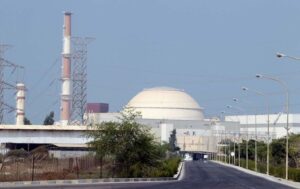
The National Interest Foundation Newsletter
Issue 290, June 20, 2025
Welcome to our NIF Newsletter. In this week’s edition, we provide analysis regarding how Israel is using three-decades-old claims that Iran is a few days away from acquiring a nuclear bomb to justify war on Iran, while also examining President Trump’s potential decision to join Israel in their attacks on Iran and its dangerous consequences.
Editor: Bassam Tarbush
Israel Uses Three-Decades-Old Claims That Iran is a Few Days Away from Acquiring a Nuclear Bomb to Justify War on Iran

Assessments have long refuted Israeli claims that Iran is on the brink of a nuclear weapon. (Photo from AFP)
As the troubling conflict between Israel and Iran intensifies, it is worth examining the major factors that have propelled the outbreak of this. One of these is undoubtedly the longstanding Israeli claims about the state of Iran’s nuclear program, which has dangerously been used to try and warrant aggression for years. Since the mid-1990s, Israeli Prime Minister Netanyahu has repeatedly alleged that Iran is on the verge of a nuclear weapon – something that has proven to be untrue time and time again. On numerous occasions, he has painted a picture of a situation in which Iran is “extremely close” to attaining a weapon, only for these timeframes to come and go without the dire fearmongering predictions materializing. Official assessments from U.S. intelligence agencies and others over the preceding years have consistently found that Iran has not been actively pursuing a weapon. Similarly, the International Atomic Energy Agency (IAEA) – the United Nations’ nuclear watchdog organization – has stated that it has found no evidence of Iranian nuclear weapons production. Even Israeli assessments have been at odds with frequent politician statements, as Mossad summaries have relayed that an Iranian nuclear weapon is in fact not imminent, and that military action against the country is what could actually end up spurring the development of a weapon.
Analysts who argue that the aforementioned Israeli rhetoric regarding Iran is aimed at provoking conflict and seeking to drag the United States into unnecessary wars point to how Israeli officials like Netanyahu have done so previously in other instances. Back in 2002, Netanyahu addressed U.S. Congress and spoke in support of an American invasion of Iraq. He predicted that “If you take out Saddam’s regime, I guarantee you that it will have enormous positive reverberations on the region.” Of course, the Iraq War ultimately proved to be a catastrophic disaster which paved the way for massive instability and destruction in the region. Now, with what has been unfolding between Israel and Iran, and the risk of harmful U.S. entanglement in the conflict, commentators cannot help but draw a parallel to what took place regarding Iraq in the early 2000s – with some labeling it the Iraq War 2.0. In both cases, falsehoods have been put forth about nonexistent weapons of mass destruction, and in the latest instance with Iran, government officials had even recently been engaged in multiple rounds of talks with the United States aimed at reaching a new nuclear deal before the unprovoked Israeli attack.
Diplomacy had already proved to be effective in the past. When an emphasis was placed on this rather than reckless belligerence, the efforts to address Iran’s nuclear program culminated in the landmark Joint Comprehensive Plan of Action (JCPOA), more commonly known as the Iran nuclear deal, in July of 2015. The agreement had widespread international backing and placed significant restrictions on Iran’s nuclear activities by establishing global monitoring and verification measures, in exchange for sanctions relief. Under the stipulations of the deal, Iran committed to significantly reducing the number of centrifuges it operates and limiting uranium enrichment levels to those that are suitable for civilian use, but not weapons-grade. It also agreed to enhanced monitoring and verification that would allow inspectors from the IAEA access to its nuclear facilities to ensure compliance with the agreement. In exchange, Iran received relief from international sanctions that allowed it to regain access to some of its frozen assets and reconnect with the global financial system.
Experts have outlined that Iran largely adhered to the JCPOA until the United States withdrew from the agreement in May of 2018, something that was consistently verified by the IAEA. Prior to this, Iran was generally seen as complying with the deal’s limitations on its nuclear activities and only began to gradually step back from its commitments after the U.S. withdrawal. Thus, many observers contend that the primary reason Iranian nuclear activities have moved forward in recent years is because of the U.S. withdrawal, with Iran seemingly using nuclear advancements as a bargaining tool to try and push for a new deal. As has been outlined as well, the U.S.-Iran nuclear talks that had been ongoing before Israel’s attack on Iran are the only legitimate and sustainable means of addressing Iran’s nuclear program while also safeguarding American national security interests in the Middle East. Principled U.S. officials have stressed that there is a great weariness among the American public regarding the United States’ potential entanglement in another “forever war.” This is precisely why a majority of Americans support negotiations with Iran rather than military action. Yet now, escalations in the ongoing conflict between Israel and Iran gravely risk dragging in the United States.
Trump’s Potential Decision to Join Israel in Their Attacks on Iran and Its Dangerous Consequences

Involvement would have an array of harmful impacts and runs counter to Trump’s pledge not to draw the U.S. into foreign wars. (Photo from Getty Images)
One of the most pressing questions related to what is currently taking place between Israel and Iran is whether or not the United States will involve itself in the conflict. Most commentators overwhelmingly assert that U.S. intervention would not serve American interests, and on the contrary, a widening war would result in a host of negative consequences. Among others, these include the increased likelihood that the conflict would expand and become a broader regional war, the disruption to global trade, oil production, and supply chains particularly in the strategically important Strait of Hormuz, the undermining of the prospects for diplomatic engagement, further destabilization in the Middle East, and the direct threat that would be posed to American military personnel, bases, embassies, and civilians. Ultimately, the possibility of direct American involvement in the conflict has added to fears of a wider conflagration as experts anticipate that this would draw a swift retaliation from Iran against U.S. troops stationed across the Middle East.
If the Trump administration was to directly take part in Israel’s attacks on Iran, American troops would certainly be put in harm’s way. Some analysts have predicted that U.S. personnel stationed in Iraq, Kuwait, and Bahrain would likely be Iran’s first targets should this take place. In fact, due to this, nonessential American personnel and family have already been withdrawn from the embassies in those three respective countries. U.S. bases in Qatar and the United Arab Emirates could be the target of Iranian attacks as well, should the United States insert itself into Israel’s military attacks on Iran. It has been estimated that it would only take a few minutes for ballistic missiles fired from Iran to hit American bases in some of these Gulf countries, and as such, the extremely small window of time for air defenses could be problematic and worryingly put American lives at risk.
In addition to the direct peril to American troops and personnel that U.S. involvement in Israeli attacks on Iran could trigger, Iran has threatened to shut down the Strait of Hormuz – a major global trade passageway where approximately 20% of the world’s oil supply flows through – and even seed the strait with as many as 6,000 naval mines. This could cause serious damage and disruption regarding trade for both suppliers and buyers, which would not only severely impact supplies, but also lead to significant price hikes. According to experts, Iran possesses the advanced technology, weaponry, and capabilities to substantially disrupt operations in the Strait of Hormuz, including the aforementioned naval mines as well as anti-ship missiles and fast boats. Furthermore, in the past, it has demonstrated the ability to deploy these using various methods, raising legitimate concerns about maritime security and the potential upheaval of global trade and energy flows should the United States decide to carry out direct military operations against Iran.
A clear understanding regarding the negative impacts of potential American involvement in Israel’s war on Iran has prompted a bipartisan effort to block it without Congressional approval. Earlier this week, U.S. Representative Thomas Massie (R-KY) joined with several Democratic colleagues to introduce a war powers resolution in the House that would require a vote by Congress before Trump could attack Iran, while U.S. Senator Tim Kaine (D-VA) put forth similar legislation in the upper chamber of Congress. The proponents of the bills have been quick to point out that Trump campaigned on keeping the United States out of foreign wars, and that U.S. insertion would assuredly lead to a widening of the conflict, further regional destabilization, and undermine the prospects for diplomacy. The U.S. Constitution grants Congress the sole power to declare war, and the extent of the president’s authority to enter into conflict abroad without the approval of the legislative branch has been challenged in recent years. Co-sponsor of the House legislation U.S. Representative Ro Khanna (D-CA) put it aptly when he remarked “Are you with the neocons who led us into Iraq or do you stand with the American people?” In addition to the two aforementioned bills, U.S. Senator Bernie Sanders (I-VT) introduced legislation in the preceding days aimed at preventing the use of federal funds in possible military actions against Iran without the approval of Congress. Sanders condemned Israeli Prime Minister Netanyahu’s reckless attacks on Iran, expressing that they violate international law and risk igniting a full-blown regional war. He also accused Israeli officials of deliberately sabotaging U.S.-Iran nuclear talks with the unprovoked military actions.
So far, President Trump has remained ambiguous regarding whether or not the United States will take part in Israel’s bombardment of Iran. Yesterday, the White House relayed that Trump will decide on potential action against Iran within the next two weeks. Meanwhile, several European foreign ministers are meeting with their Iranian counterpart in Geneva today in the latest bid for diplomacy.
